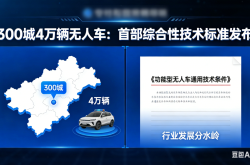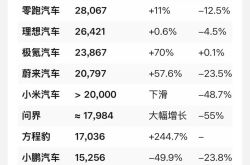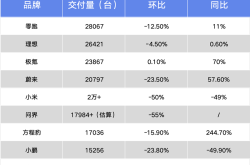ChatGPT search engine experience: too disruptive! Has a new round of search wars officially broken out?
![]() 11/04 2024
11/04 2024
![]() 619
619
ChatGPT Search, which has been rumored and undergone small-scale gray-scale testing, was officially launched early this morning, opening to paid ChatGPT Plus and Team users, as well as SearchGPT waitlist users. According to ChatGPT's plans, they will gradually open access to other users, including all free users, in the coming weeks.
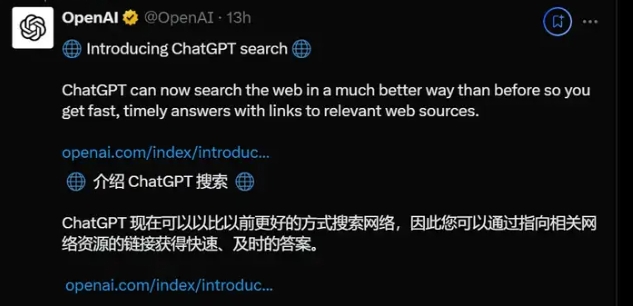
Source: Twitter
Moreover, these users do not need to register for a ChatGPT account to use ChatGPT Search, which can be seen as a direct challenge to Google's overseas search hegemony. After all, the simplest and most direct method of use fits the scenario of search engines. If users need to log in to search for news, most users will likely return to their familiar Google.
Interestingly, ChatGPT Search is not developed as a separate AI module but is integrated as a function switch into different AI models, currently supporting GPT-4o and GPT-4o mini. A "Search Web" switch is added next to the attachment upload, and when enabled, the AI model will prioritize collecting and summarizing information from trusted websites.

Source: Lei Tech
What is the difference between ChatGPT Search and the regular version? Can it challenge Google's dominant position in search? Below is Lei Tech's experience sharing.
Disruptive Search Experience
The advantage of AI search lies in its higher efficiency and intelligent experience. Users receive not a pile of web pages but a summarized answer based on the information from these web pages. Although it may seem similar to AI question-and-answer, there are obvious differences in the actual results, such as significantly improved accuracy.
For example, if you have just arrived in a new city (let's use Guangzhou as an example) and want to quickly understand the local scenery and cuisine, you might search for "Guangzhou cuisine scenery." At this point, traditional search engines will return a pile of web pages, which you need to click through one by one.
In contrast, AI search engines extract key points from these web pages based on their weight and summarize them into a guide for you. Below is the answer provided by ChatGPT Search:
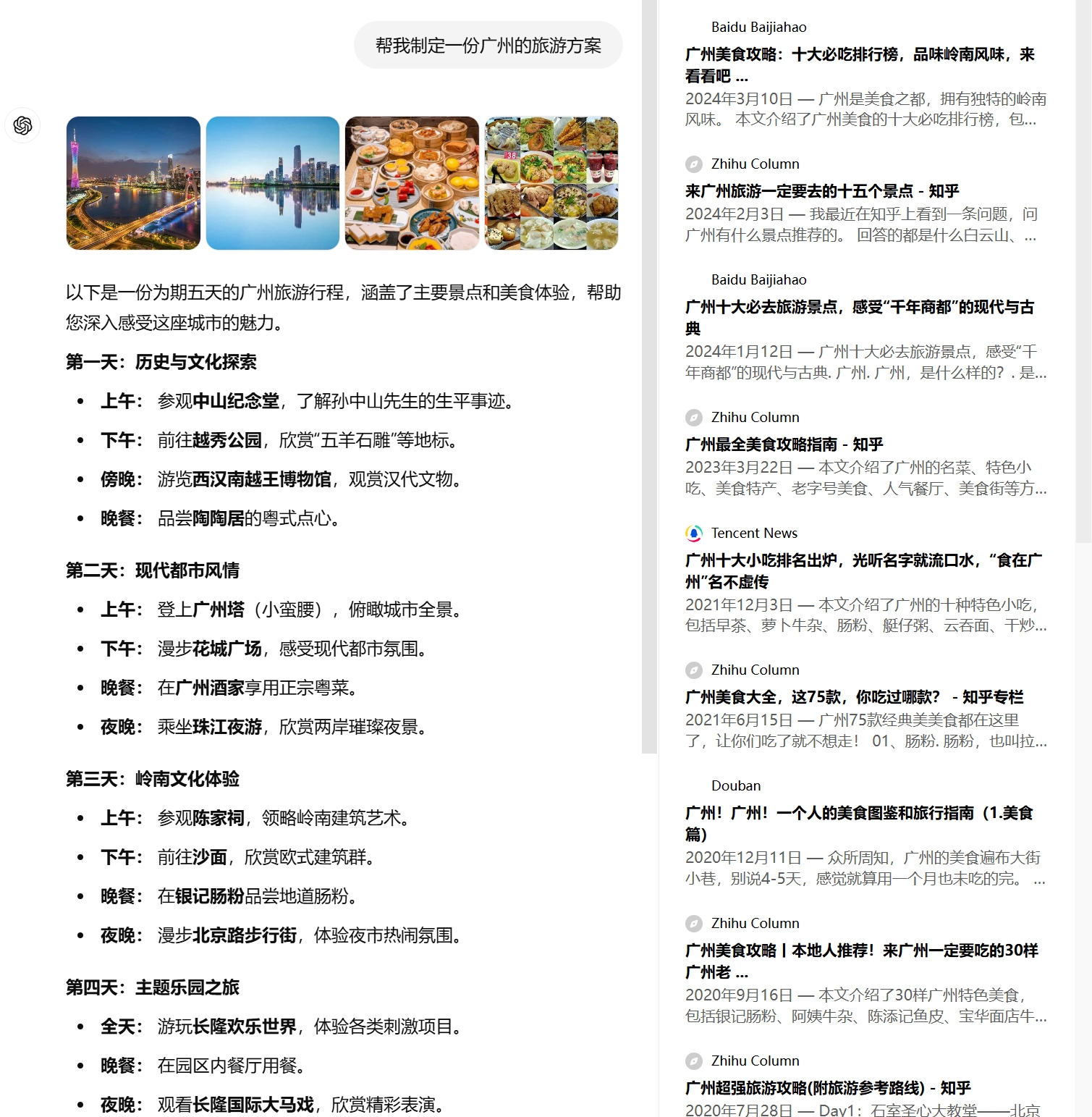
Source: Lei Tech
As you can see, the answer not only lists images from the webpage but also pinpoints the location to the specific business name. In contrast, the regular version of ChatGPT would only give a general location unless the user further inquires, at which point it would provide precise restaurant recommendations.
Some users accustomed to domestic AI may ask: Domestic AI can also pinpoint restaurants when making travel plans, so what is the difference with ChatGPT Search? The difference lies in the fact that domestic AI has undergone corresponding algorithm training for domestic cities, whereas ChatGPT Search simply aggregates results directly from web pages based on Chinese + city, meaning that regardless of the question, a similarly precise response can be obtained without prior optimization by engineers.
Furthermore, the relevance of the response in terms of time will also be significantly improved. For example, when I asked ChatGPT Search, "What news is worth paying attention to today?" the answer provided focused mainly on October 31 (the question was asked in the morning of November 1).
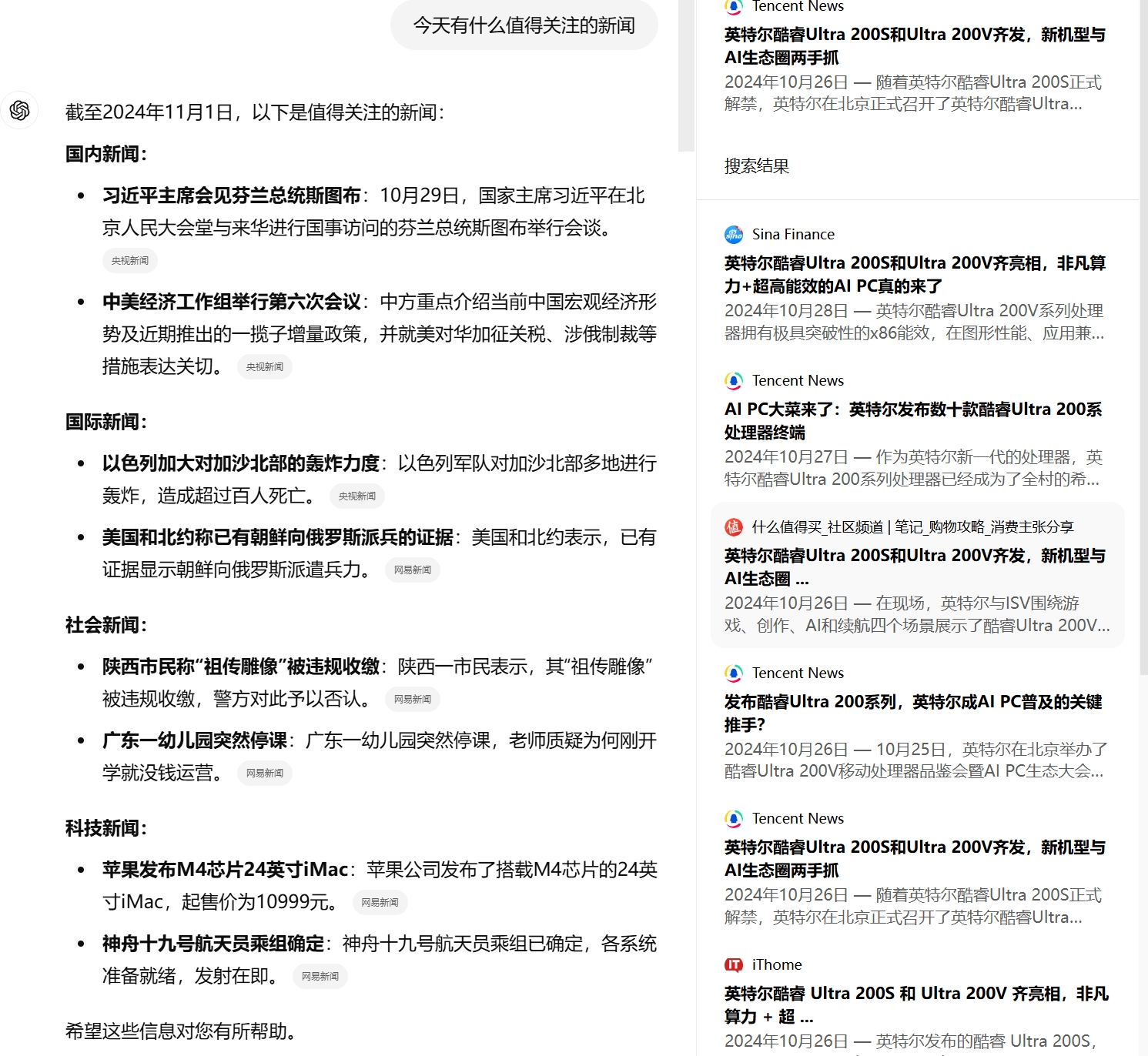
Source: Lei Tech
You can also directly ask, "Which platform has the cheapest iPhone 16 Pro for this year's Double 11 sale?" ChatGPT Search will also aggregate answers based on time and list a series of websites for users to check the correctness of the answer or learn more about promotional policies.
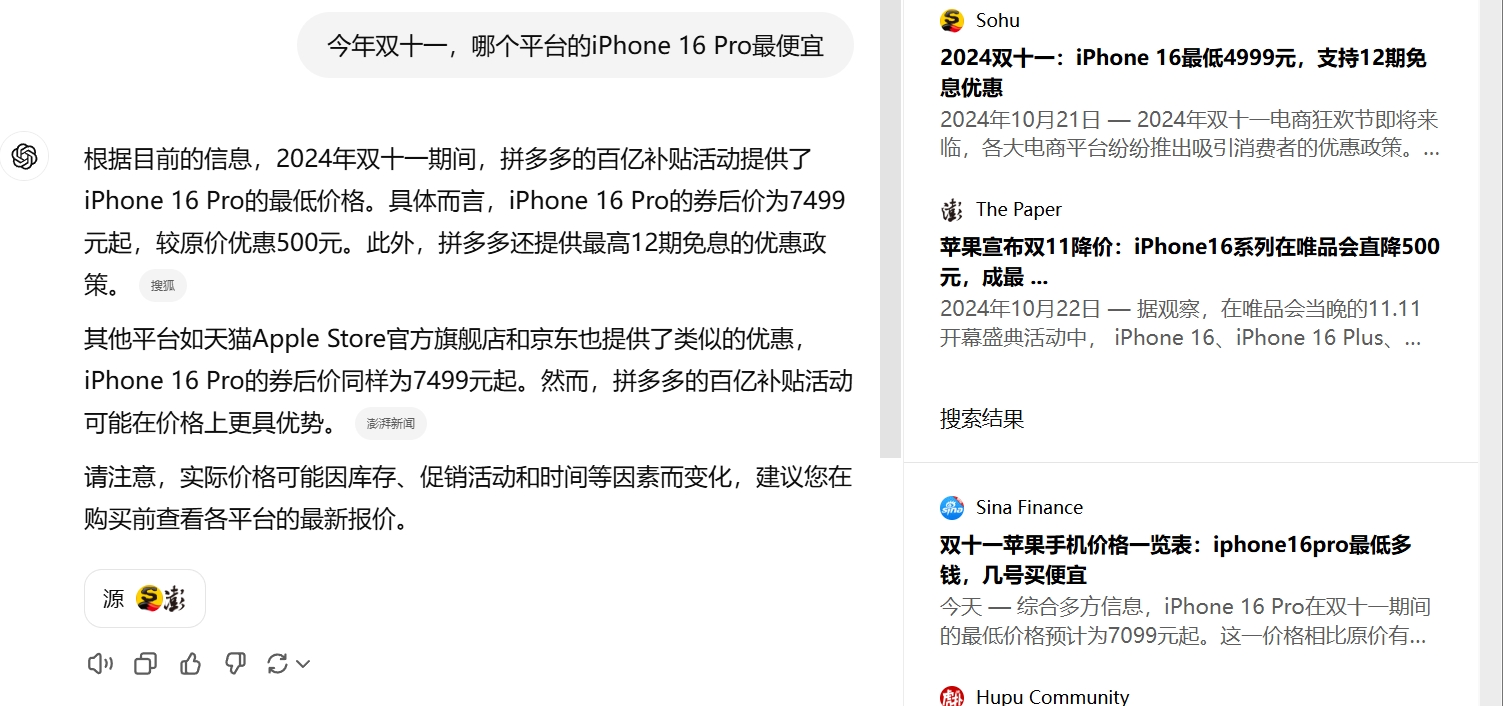
Source: Lei Tech
In contrast, GPT-4, which does not support web search mode, performs significantly worse on the same question. Although it retrieves relevant information, it lists the iPhone 16 Pro Max instead, and the retrieved information is relatively lagging.
When asking the same question to Google, the answer is basically predictable—only a pile of website links will be provided, without any changes.
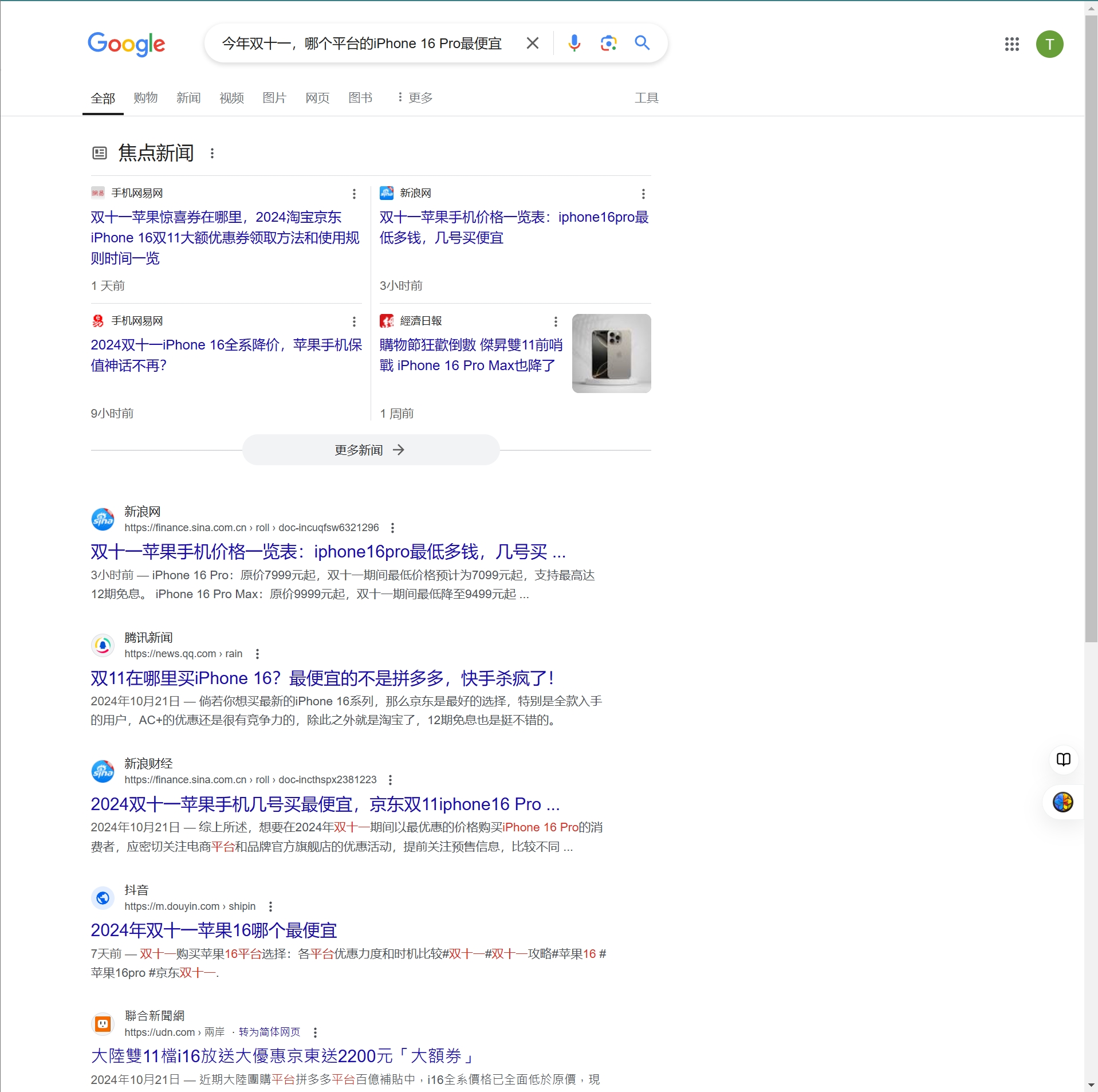
Source: Lei Tech
Interestingly, after the launch of ChatGPT Search, Google also urgently launched the Gemini Google Engine mode. However, the user experience is somewhat abstract, with constant counter-questions to improve information accuracy, akin to a Russian nesting doll process. I received a detailed answer only after responding four times, but the information was severely lagging.
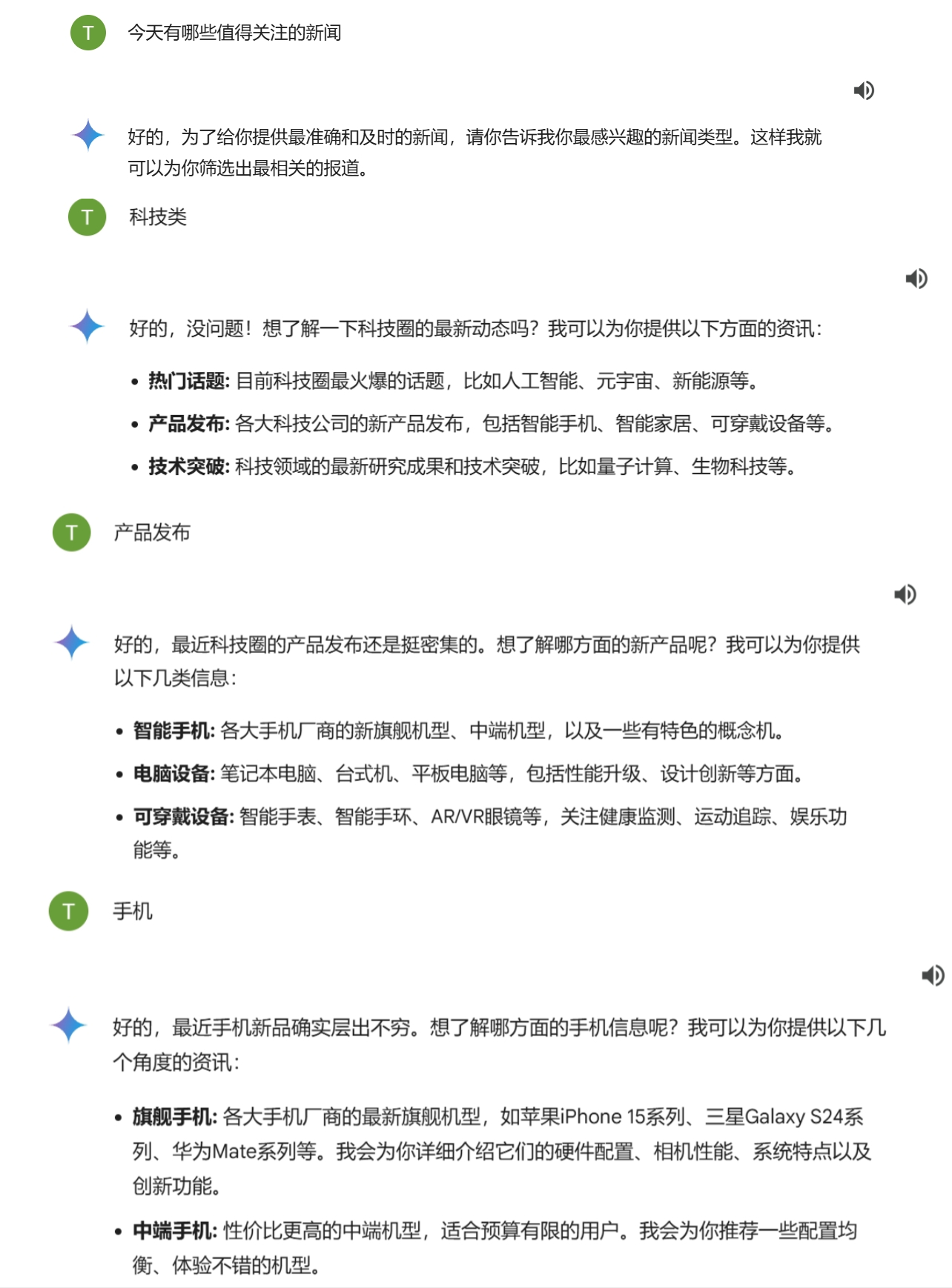
Source: Lei Tech
This issue initially caused trouble for ChatGPT Search as well, but the correct answer was quickly obtained after a simple follow-up inquiry, while Gemini still did not provide the correct answer.
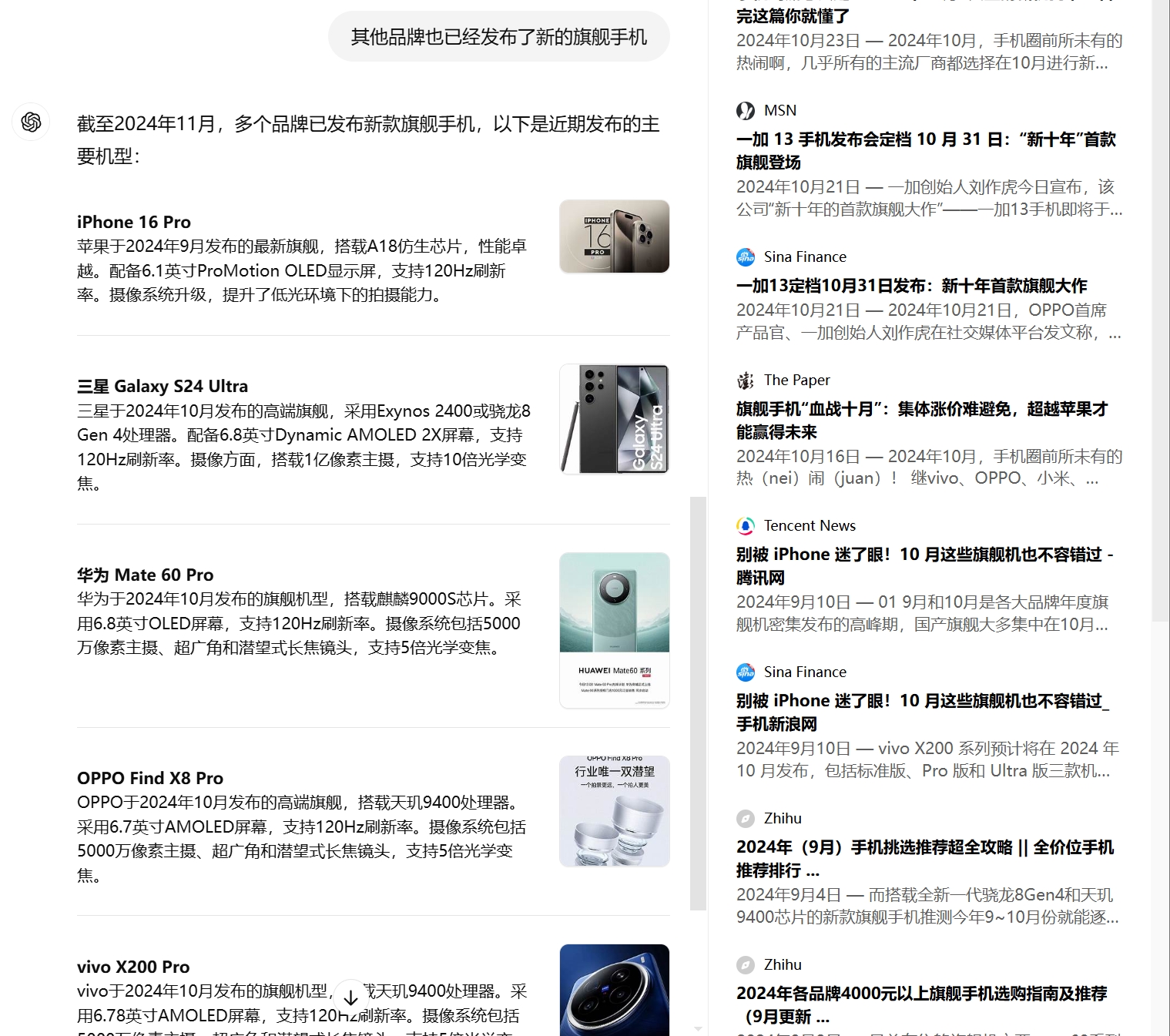
Source: Lei Tech
In comparison, Baidu's AI intelligent response encountered the same issue, mistaking last year's flagship phones as the latest models. Due to the lack of a follow-up inquiry mechanism, it was unable to guide the response. However, in the web version of Wenxin Yiyan, the performance was much more satisfactory, providing the correct answer without guidance. Even the free version 3.5 is not inferior to ChatGPT Search in terms of Chinese web search capabilities.
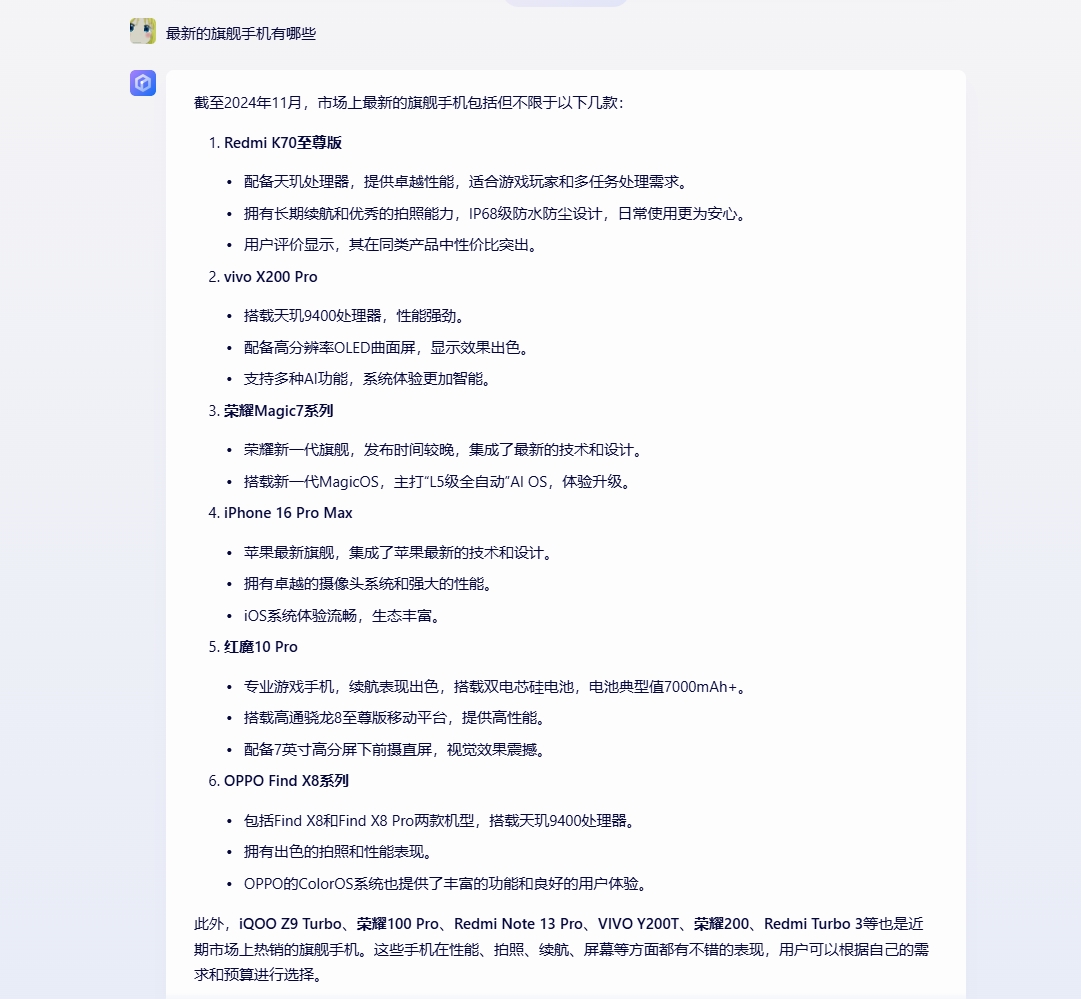
Source: Lei Tech
Another advantage of AI search over traditional search is that you can continuously inquire and request the AI to further integrate answers. For example, I asked ChatGPT Search about recent comic conventions in Guangzhou and then requested it to organize the information into a table and Excel file, which could be directly downloaded to the device.
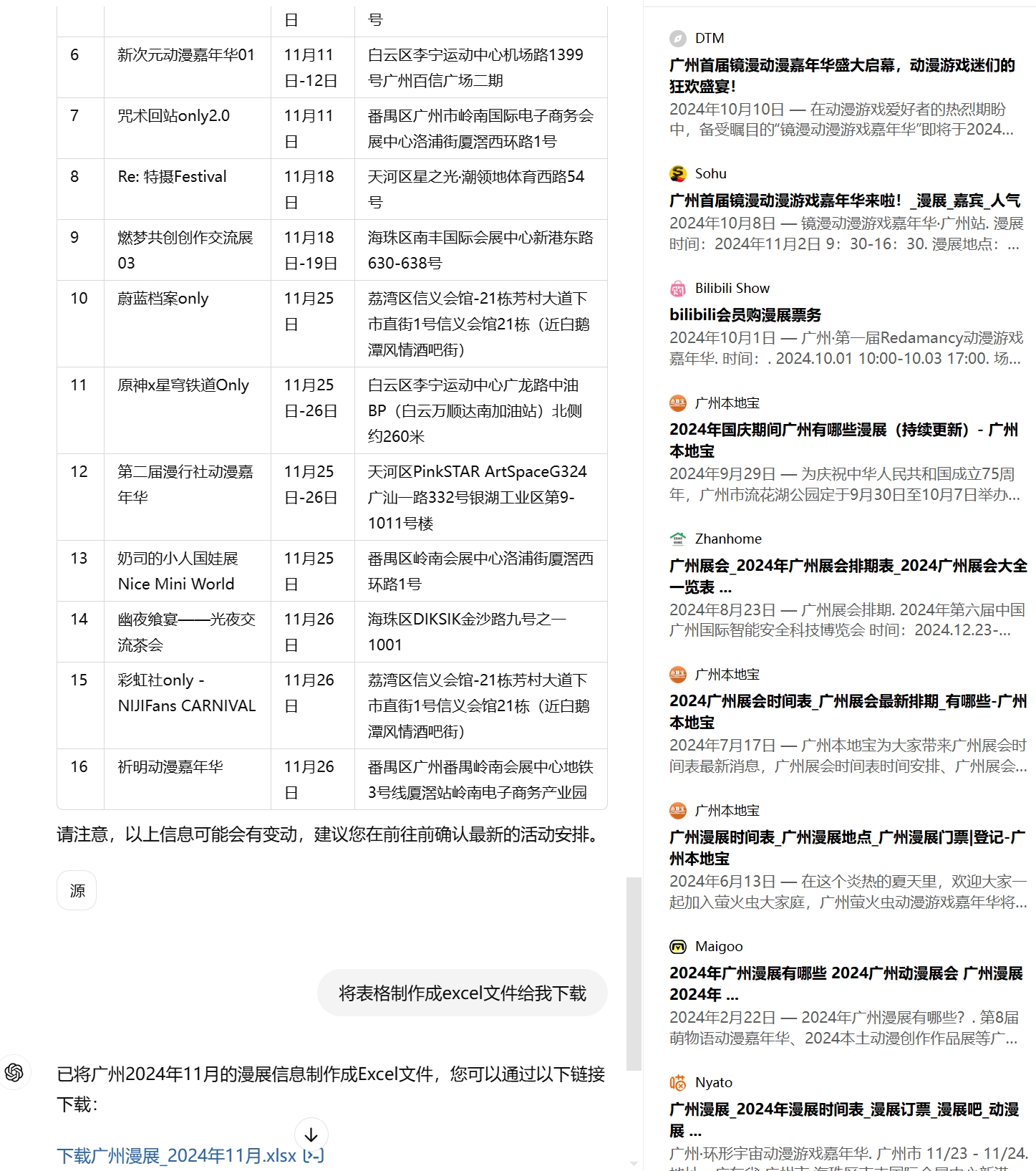
Source: Lei Tech
I believe this is the biggest advantage of AI search over traditional search—it is not just search but can further refine and manipulate information based on user requirements, saving a lot of time for questions requiring the retrieval of large amounts of data.
OpenAI's Dimensionality Reduction Strike on Google
Google's dominant position in the search field over the years has made it very arrogant when facing other companies, accumulating much dissatisfaction. For example, if you want your content to appear on the Google search page, you must pay Google; otherwise, only users who precisely target your website with keywords will see your information.
Coupled with advertising bidding and other tactics, Google has caused much suffering for many news media. Many companies have long wanted to get rid of Google but have struggled to find an alternative. Google's ultra-high market share basically means that abandoning cooperation will lead to a cliff-like decline in website traffic and attention.

Source: Lei Tech
Even renowned media outlets like The Washington Post pay a significant amount of money to improve their ranking in order to outrank their competitors in search results. Therefore, the emergence of new competitors can at least force Google to lower its marketing fees in related areas, which is good news for major companies (although Bing exists abroad, its user experience is significantly inferior to Google's).
The launch of ChatGPT Search indicates that OpenAI has reached agreements with major publishing groups, allowing large AI models to directly retrieve their data to provide truly effective answers. However, if ChatGPT Search requires accessing the ChatGPT webpage to use, it can be quite cumbersome. Therefore, ChatGPT has developed a dedicated Chrome extension that pops up a prompt for you to download when you first use ChatGPT Search. After installation, it will directly replace the browser's default search engine with ChatGPT Search.

Source: Lei Tech
After entering a question in the search bar, it will directly jump to ChatGPT and generate a new conversation. The process is smooth, and the experience is decent. However, the generated conversation is not temporary, and the data will be saved and archived by ChatGPT. As the number increases, it will occupy the left record bar, making it extremely difficult to find previous conversation records.
Moreover, ChatGPT Search's approach has raised concerns about privacy among many users, who do not want their every search to be recorded, especially when involving personal privacy information. Therefore, I personally suggest that ChatGPT consider adding a setting switch to allow users to decide whether the conversation generated directly through the search bar is temporary.
Undeniably, the experience of ChatGPT Search is very attractive. It breaks the traditional search engine model of "you search, I list web pages" and transforms it into "you ask, I answer." However, there is a significant issue: how to make a profit? We all know that even if OpenAI does not consider profit, it must at least minimize losses. Opening ChatGPT Search to everyone will undoubtedly further increase computing costs. How will OpenAI fill this cost gap?
Regarding this, their CEO Altman stated that the number of searches for free users will be limited, and they will consider other profit models in the future. Does this mean that traditional search engine advertising models such as "bidding weight" and "priority display" will be introduced? We do not know for sure now, but I believe it is only a matter of time.
Moreover, Google will not sit idly by. With the majority of search traffic already under its control, the subsequently optimized AI search of Gemini will be ChatGPT's biggest competitor. It is foreseeable that in the coming years, competition between traditional and AI searches will intensify, but users will also benefit from technological advancements in this process, enjoying more efficient and intelligent search experiences.
Source: Lei Tech

